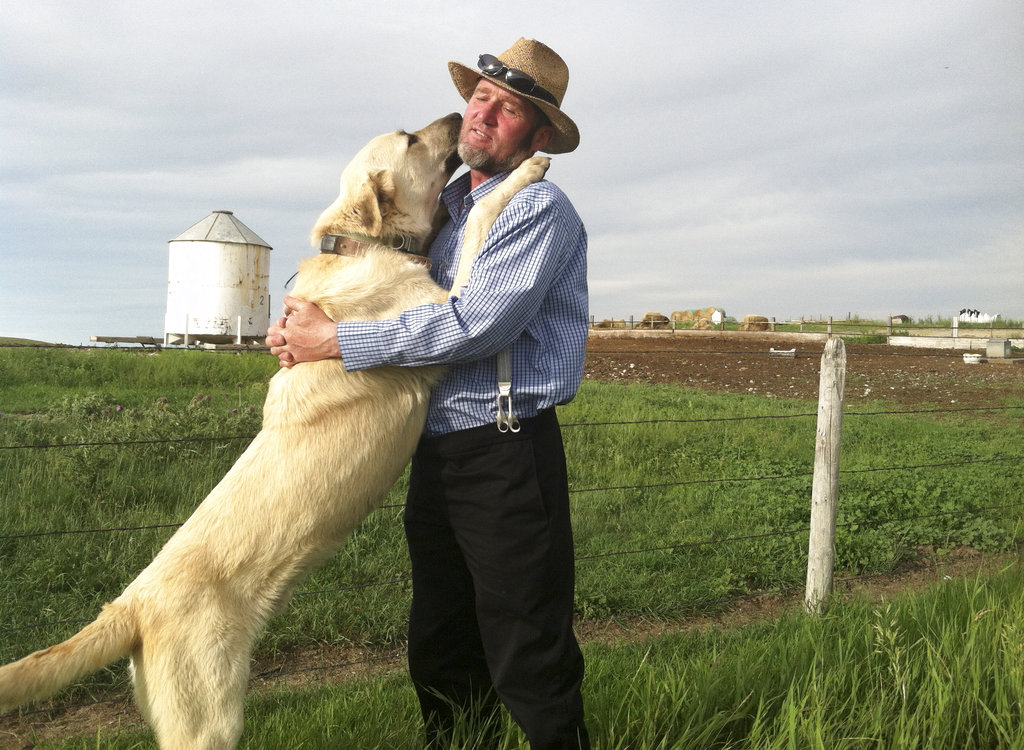Dogs bred to defend sheep from wolves deployed for US study

In this 2013 photo provided by the U.S. Department of Agriculture, a Kangal dog greets Ben Hofer of the Hutterite Rockport Colony near Pendroy, Mont. Image: Julie Young/U.S. Department of Agriculture via AP
BOISE, Idaho (AP) — Federal scientists are trying to decide if it’s time to let the big dogs out.
Nearly 120 dogs from three large breeds perfected over centuries in Europe and Asia to be gentle around sheep and children but vicious when confronting wolves recently underwent a study to see how they’d react to their old nemesis on a new continent.
The dogs were gathered as puppies in Portugal, Bulgaria and Turkey and sent to the American West, where they spent four years guarding sheep.
“When we were first looking at doing this, a lot of people wanted to know: What dog do I use in dealing with wolves and grizzly bears?” said Julie Young, a Utah-based research biologist with the U.S. Agriculture Department’s National Wildlife Research Center.
The department looked to areas where dog breeds developed to guard sheep against wolves and brown bears. Then scientists supplied Cao de Gado Transmontanos, a large though lean and agile dog developed in a mountainous region of Portugal; Karakachans, developed by nomadic sheepherders in a mountainous area of Bulgaria; and Kangals, another powerful breed with an instinct for guarding, this one originating in Turkey.
Dogs from all three breeds can weigh up to 140 pounds (64 kilograms), about the size of a wolf. The dogs were sent to guard 65 herds in Idaho, Montana, Wyoming, Washington and Oregon.
Scientists are still analyzing information from notes, remote cameras and GPS collars, Young said, with four or five scientific papers expected in the next year. But overall, she said, the dogs did well keeping away wolves and better than traditional guard dogs at deterring coyotes.
One dog died during the study. It was hit by a vehicle as sheep crossed a road.
For decades, most U.S. sheep producers have used large white dogs such as Great Pyrenees, Akbash or Maremma Sheepdogs. Light brown Anatolian Shepherds are also used.
But the reintroduction of wolves in the American West in the 1990s has led to questions about whether those breeds are up to the task. Since wolves returned to Idaho in 1995, the Agriculture Department’s Wildlife Services says, wolves have killed 50 guard dogs through the end of last year and injured nearly 40 others in the state. Federal officials in 2017 killed 56 wolves in Idaho due to attacks on livestock.
Young said the study found wolves left areas when sheep bands, dogs and herders arrived, but their absence emboldened smaller predators such as coyotes.
Not all dogs in the study succeeded. Jill Swannack, president of the Washington State Sheep Producers, is a veterinarian who also has a ranch with about 800 sheep on private land in eastern Washington state. She received three Karakachans.
“When we came home, they preferred to be home with us,” she said. “They really didn’t bond to the sheep.”
She also said the dogs were only about 70 or 80 pounds (32 to 36 kilograms). One went to a young family with sheep near their house, and now that dog plays with the children and has successfully guarded those sheep against coyotes.
The dogs that work best at her ranch are Anatolian Shepherds, though wolves killed one in 2014.
Wolves are a “phenomenal predator,” Swannack said. “I would be happy if we didn’t have them, but I’m also a realist, and we do have them. So we need the tools to deal with them and the support.”
Ranchers can call the Agriculture Department’s Wildlife Services to kill wolves that attack livestock. Environmentalists, though, have been working to reduce the need for that and see guard dogs as one solution.
“Most of the year, the livestock guardian dogs are an excellent deterrent,” said Suzanne Stone of Defenders of Wildlife, noting the exception is in the spring when wolves are guarding dens with pups.
The imported guard dogs cost about $500 apiece, including transportation to the U.S., Young said, and nearly all were just a few months old when they arrived.
She said the Karakachans tended to be more vigilant, the Kangals inclined to investigate, and the Cao de Gado Transmontanos better at assessing threats. Ultimately, she said, sheep producers might benefit from a mix of dogs that includes some that stick near the sheep and others that patrol the perimeter.
Another part of the study involved the relationship between dogs and herders, many Peruvians, which will be one of the scientific papers.
“There’s a bond there,” Young said. “Just from watching them and looking at data, the ones who were better bonded, the dogs just seemed to perform better.” NVG
RELATED STORIES:
Mexican gray wolf population grows by 1 animal, survey says